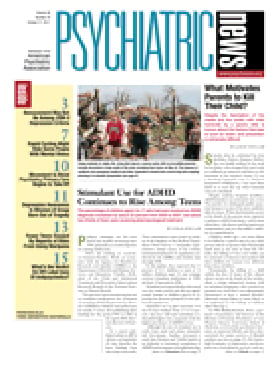Serological Prediction of Cocaine Relapse May Be Possible
• Cocaine dependence is associated with high relapse rates, but few biological markers associated with relapse outcomes have been identified. Extending preclinical research with mice showing a role for central brain-derived neurotrophic factor (BDNF) in cocaine seeking, researchers at Yale University School of Medicine examined whether serum BDNF is altered in abstinent, early-recovering, cocaine-dependent individuals and whether it is predictive of relapse risk.
Serum samples were collected on three consecutive mornings from 35 treatment-engaged, three-week-abstinent cocaine-dependent inpatients (17 males, 18 females) and 34 demographically matched healthy control participants (17 males,17 females). Cocaine-dependent individuals were prospectively followed up 14, 30, and 90 days after discharge to assess cocaine relapse outcomes. Outcome measures were time to cocaine relapse, number of days of cocaine use (frequency), and amount of cocaine use (quantity).
Significantly higher mean serum BDNF levels were observed for the cocaine-dependent patients than for the control subjects. Higher serum BDNF levels predicted shorter subsequent time to cocaine relapse, greater use frequency, and higher total amounts of cocaine used.
"High serum BDNF levels in recovering cocaine-dependent individuals are predictive of future cocaine relapse outcomes and may represent a clinically relevant marker of relapse risk," said the researchers.
D'Sa C, Fox H, Hong A, et al. Increased Serum Brain-Derived Neurotrophic Factor Is Predictive of Cocaine Relapse Outcomes: A Prospective Study. Biol Psychiatry. 2011. July 17 [Epub ahead of print]. An abstract is posted at <www.ncbi.nlm.nih.gov/pubmed/21741029>. Can Impulsivity Predict Mortality?
• Although previous research has shown that impulsivity can be a significant predictor of mortality, no studies appear to have applied this information to individuals with alcohol-related problems or examined moderation of this effect via sociocontextual processes.
Researchers at Stanford University School of Medicine recently addressed these issues in a mixed-gender sample of individuals seeking help for alcohol-related problems. They evaluated 628 participants at baseline (47.1 percent women); 515 and 405 participated in follow-up assessments at years 1 and 16, respectively. Ninety-three individuals were known to have died between the baseline and 16-year follow-up. After controlling for age, gender, and marital status, higher impulsivity at baseline was associated with an increased risk of mortality during years 1 to 16; however, this association was accounted for by the severity of alcohol use at baseline.
In addition, the association between year 1 impulsivity and 15-year mortality risk was moderated by interpersonal support at year 1, such that individuals high on impulsivity had a lower mortality risk when peer/friend support was high than when it was low.
"The dire effects of impulsivity on risk for mortality may not reach fruition for individuals who are able to maintain a strong peer-support network," wrote the researchers.
They believe their findings highlight impulsivity as a robust and independent predictor of mortality and suggest the need to consider interactions between personality traits and sociocontextual processes in the prediction of health-related outcomes for those with alcohol use disorders.
Blonigen D, Timko C, Moos B, et al. Impulsivity Is an Independent Predictor of 15-Year Mortality Risk Among Individuals Seeking Help for Alcohol-Related Problems. Alcohol Clin Exp Res. 2011. June 1 [Epub ahead of print]. An abstract is posted at <www.ncbi.nlm.nih.gov/pubmed/21631544>. Link Between Caffeine and Pediatric Depression Studied
• Do depressed children self-medicate with soda? A group of Brazilian researchers have reported data that suggest that depressed children consume more caffeinated drinks than nondepressed children, primarily in the form of sugary soft drinks. They looked at 51 children aged 9 to 12 who were assessed for depressive symptoms with the Children's Depression Inventory (CDI) and whose eating habits were assessed with the Nutrition-Behavior Inventory (NBI). The children were compared with control children without psychopathology attending public schools in a Brazilian city.
Participants with CDI scores of 15 or higher also had high NBI scores, suggestive of a relationship between depressive symptoms and environmental factors. Additional analysis showed that caffeine, not food or "sweets," was associated with depressive symptoms, although the authors noted that the primary vehicle for caffeine consumption in children was soft drinks, which also contain large amounts of sugar.
"We cannot determine whether the high consumption of caffeine in our study population was actually ‘causing’ depression or if high consumption was used to relieve some symptoms of depression," the researchers wrote. "It is possible that children meeting diagnostic criteria for major depression use caffeine to ‘self-medicate’ to ease the symptoms associated with depression."
Benko C, Farias A, Farias L, et al. Potential Link Between Caffeine Consumption and Pediatric Depression: A Case-control Study. BMC Pediatrics. 2011. Aug 25 [Epub ahead of print]. An abstract is posted at <www.biomedcentral.com/1471-2431/11/73>. Gene Variant Could be New ADHD Treatment Target
• Researchers at the National Institute on Drug Abuse (NIDA) may have explained why stimulant medications used to treat attention-deficit/hyperactivity disorder (ADHD) are less effective in patients who carry the D4.7 subtype of the dopamine receptor, the variant shown to be more common in patients with ADHD.
Working with mice, Sergi Ferre, M.D., Ph.D., found that the D4.7 dopamine receptor variant, unlike the D4.2 and D4.4 subtypes, could not interact with the short version of the dopamine type 2 receptor to reduce glutamate release in the striatum, the brain region associated with impulsivity and symptoms of ADHD in humans.
"Although previous studies have shown that dysfunctional dopamine D4 receptors are implicated in ADHD, this is the first study to show how this genetic difference might translate into functional deficits seen with this disorder," said NIDA Director Nora Volkow, M.D., about the study. "Further research is needed to explore how this deficient interaction between receptors might be remedied, which could then lead to new medications for the treatment of ADHD."
Gonzalez S, Rangel-Barajas C, Peper M, et al. Dopamine D(4) Receptor, but not the ADHD-Associated D(4.7) Variant, Forms Functional Heteromers With the Dopamine D(2S) Receptor in the Brain. Mol Psychiatry. 2011. Aug 16 [Epub ahead of print]. An abstract is posted at <www.ncbi.nlm.nih.gov/pubmed/21844870>. Children Who Lose Parents May Have Higher Alzheimer's Disease Risk
• Suffering the loss of a parent during childhood may be a risk factor contributing to later development of Alzheimer's disease (AD), and the risk differs depending on the child's age and the parent's gender, said researchers at Utah State University and the University of Utah who examined 4,108 residents aged 65 or older in a rural county in Utah. They used a multistage dementia ascertainment protocol implemented in four triennial waves, yielding expert consensus diagnoses of 570 participants with AD and 3,538 without dementia.
Children who lost their mother during adolescence or their father before age 5 had a higher risk for AD, an association that disappeared in cases in which the widowed parent remarried. The findings were specific to AD and not found for non-Alzheimer's dementia. The researchers considered confounding factors including gender, education, APOE genotype, and socioeconomic status in their analysis.
Norton MC, Smith KR, Ostbye T, et al. Early Parental Death and Remarriage of Widowed Parents as Risk Factors for Alzheimer Disease: The Cache County Study. Am J Geriatr Psychiatry. 2011 19(9):814-824. An abstract is posted at <www.ncbi.nlm.nih.gov/pubmed/21873837>. Cigarette Smoking Related to Serious Psychological Distress
• California has the world's longest-running tobacco-control program. Cross-sectional data from the 2007 California Health Interview Survey on 50,880 noninstitutionalized adults were used by researchers at the University of California to analyze smoking prevalence, cigarette consumption, and quit ratio. Individuals with serious psychological distress (SPD) were identified using the K6 scale, a clinically validated psychological screening instrument.
About 3.8 percent of California adults screened positive for SPD in the prior 30 days (acute SPD) and an additional 4.8 percent screened positive for SPD in the prior two to 12 months (recent SPD). Those with SPD were more likely to be current smokers than were those without SPD. Current smokers with acute SPD were more likely than those without SPD to smoke 20 or more cigarettes daily. The quit rate was lower among ever-smokers with acute or recent SPD than those without SPD. While people with acute or recent SPD comprised 8.6 percent of adults, they consumed 19.2 percent of all cigarettes in California.
"In California, adults with SPD were more likely to be current smokers and to smoke heavily and less likely to quit than those without SPD," wrote the researchers. "The findings underscore the need for effective smoking-cessation strategies targeting this group."
Sung H, Prochaska J, Ong M, et al. Cigarette Smoking and Serious Psychological Distress: A Population-Based Study of California Adults. Nicotine Tob Res. 2011. Aug 17 [Epub ahead of print]. An abstract is posted at <www.ncbi.nlm.nih.gov/pubmed/21849411>. 
